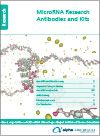MicroRNA Research Tools
Wako offers a range of Ago antibody based products to study Ago protein expression and investigate the miRNA and mRNA that associate with Ago proteins in the RISC complex.
MicroRNAs (miRNAs) are small non-coding RNA sequences, typically around 22 nucleotides in length, which act as post-transcriptional regulators of gene expression.
Mature miRNAs are localised in the cytoplasm where they bind and assemble into the RNA-induced silencing complex (RISC) to target messenger RNA (mRNA).
At the heart of every RISC is a member of the Argonaute protein family, which serves to bind the miRNAs and position them in a way that facilitates target recognition. The miRNA bind complementary sequences in the target and the RISC may then directly cleave the target RNA or recruit other gene-silencing proteins to inhibit translation.
Micro RNA Isolation
The Wako range of kits for isolation of microRNAs use an immunoprecipitation method to isolate Ago-bound miRNA and target mRNA. Wako microRNA Isolation kits use silica-based beads coated with anti-Ago monoclonal antibodies whilst the MagCapture™ range utilise magnetic beads. RNA isolated with these kits can then be used in downstream application such as quantitative PCR, cloning or microarray.
The Wako microRNA Ago 2 Mouse Isolation kit can be used with cells or tissues to recover both microRNAs and target mRNA. The Anti-Ago antibody is conjugated to polymer beads with low non-specific absorbency to enable centrifuge immunoprecipitation.
Post-immunoprecipitation the RNA is purified by phenol/chloroform and ethanol precipitation.
MagCapture™ microRNA Isolation Kits
MagCapture microRNA Isolation kits are available with a choice of anti-human Ago2 (4G8), anti-mouse Ago2 (2D4) or anti-Ago1-4 (1G3). These kits are suitable for use with mouse or human cells and tissues but can also be used to recover miRNA from culture supernatant, serum or plasma.
Following immunoprecipitation the RNA can be purified by either a single-step heated elution method to give a high yield of miRNAs or by adopting a spin-column protocol to provide a sample with high purity miRNAs.
Additionally a MagCapture microRNA Isolation kit containing Protein G beads is available, this kit enables the user to immobilise an Ago family protein antibody of choice from a selected range (Anti-Ago1 (2A7); Anti-Ago2(4G8 or 2D4);Anti-Ago3(1C12 or mA3-S9); Anti-Ago4 (2G7 or 1G3) PIWIL1 (2C12) or PIWIL2 (3C4)).
Applications
Worldwide research efforts continue to identify new types of miRNA and elucidate their function, with roles for miRNAs described in a range of biological functions including organism growth, development and metabolism. Of particular interest are circulating miRNA found in blood and other body fluids that may be associated with disease and could potentially serve as clinical markers for cancer and other diseases. Wako offers a range of antibodies and RNA isolation kits to assist researchers investigating miRNA expression, function and mRNA targets.
Argonaute proteins are of key importance in gene-silencing pathways and are subdivided into Argonaute(Ago); PIWI (named after the drosophiliaprotein P-element-induced wimpy testis); and nematode-specific worm Argonaute (Wago) proteins. Ago proteins appear to be expressed everywhere whilst Piwi protein expression is restricted mainly to the germ line. Wako provide monoclonal Anti-Ago antibodies for number of applications including can be used for a number of applications including western blotting and immunoprecipitation.
Additional Information
MicroRNAs are produced from long primary miRNA transcripts, termed pri-miRNAs, which pass through sequential endonucleolytic maturation steps to give precursor miRNAs (pre-miRNAs), typically 70 nucleotide in length, which are processed by the endonuclease Dicer to give the smaller miRNA fragments. The mature miRNAs are localised in the cytoplasm where they bind and assemble into the RNA-induced silencing complex (RISC) to target messenger RNA (mRNA). At the heart of every RISC is a member of the Argonauteprotein family, which serves to bind the miRNAsand position them in a way that facilitates target recognition. The miRNA bind complementary sequences in the target and the RISC may then directly cleave the target RNA or recruit other gene-silencing proteins to inhibit translation (Figure 1).


